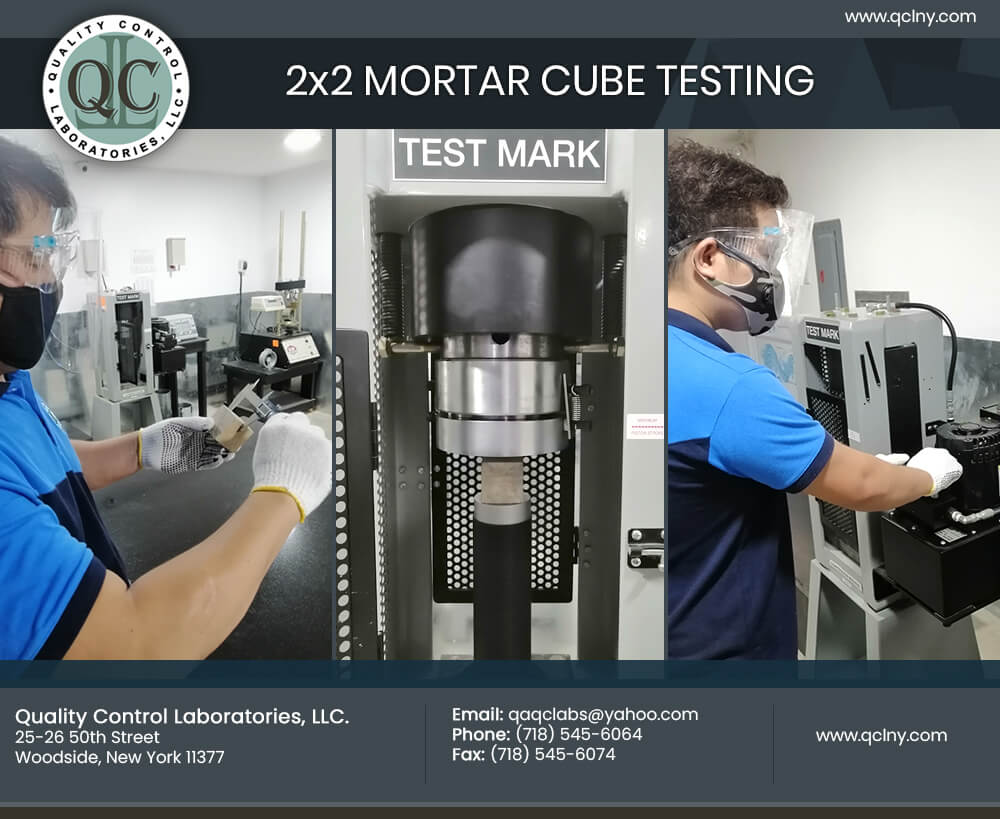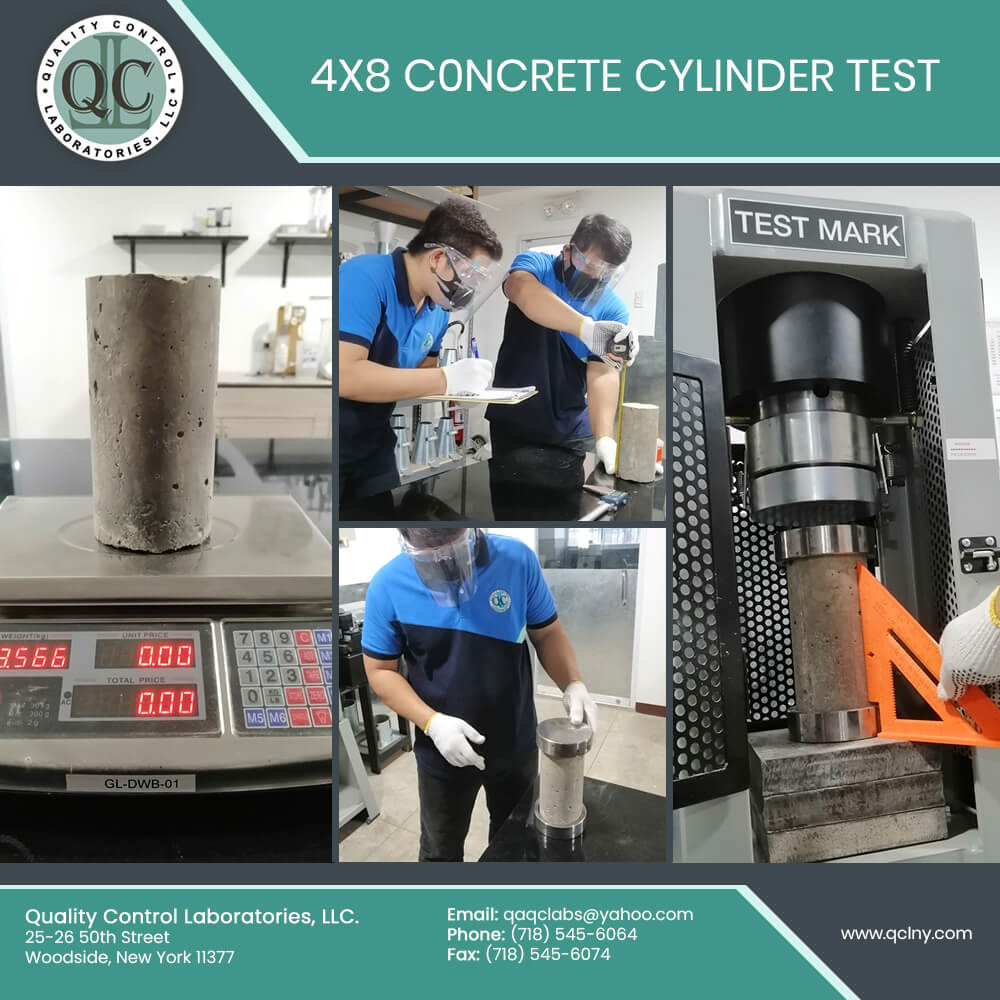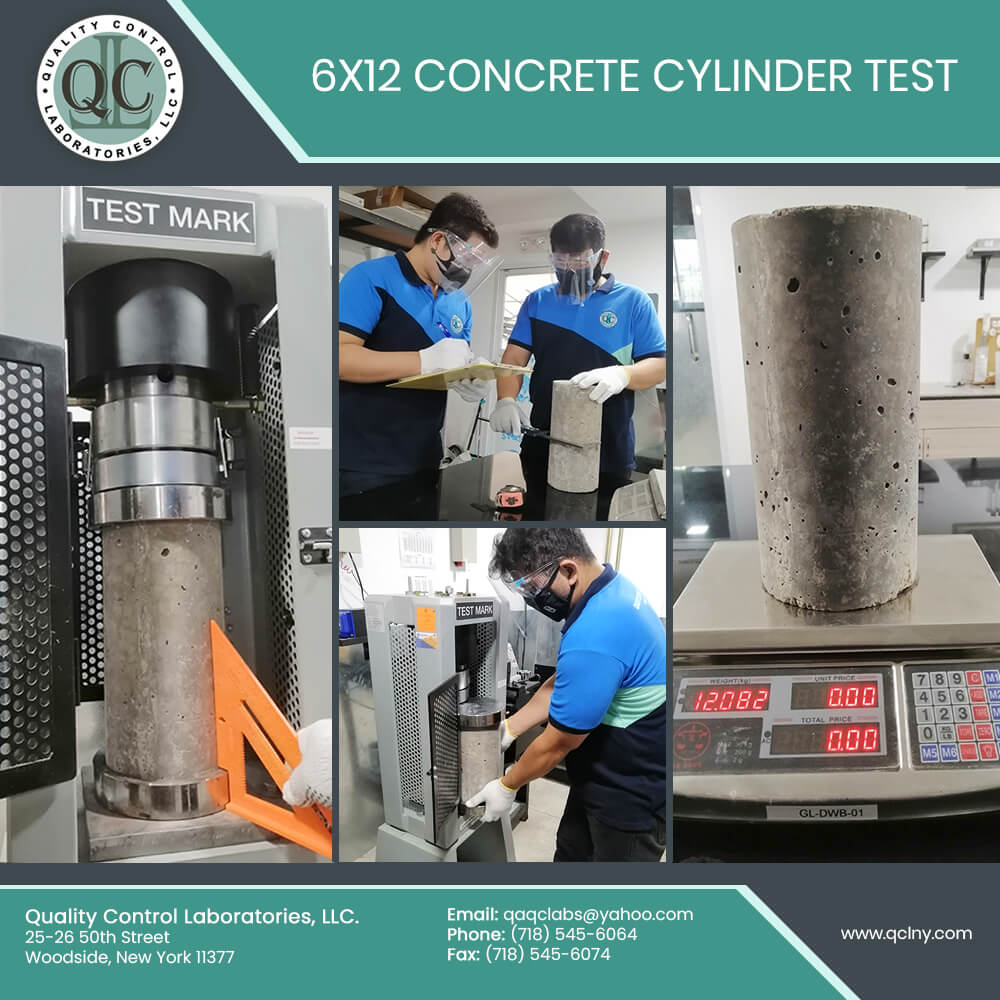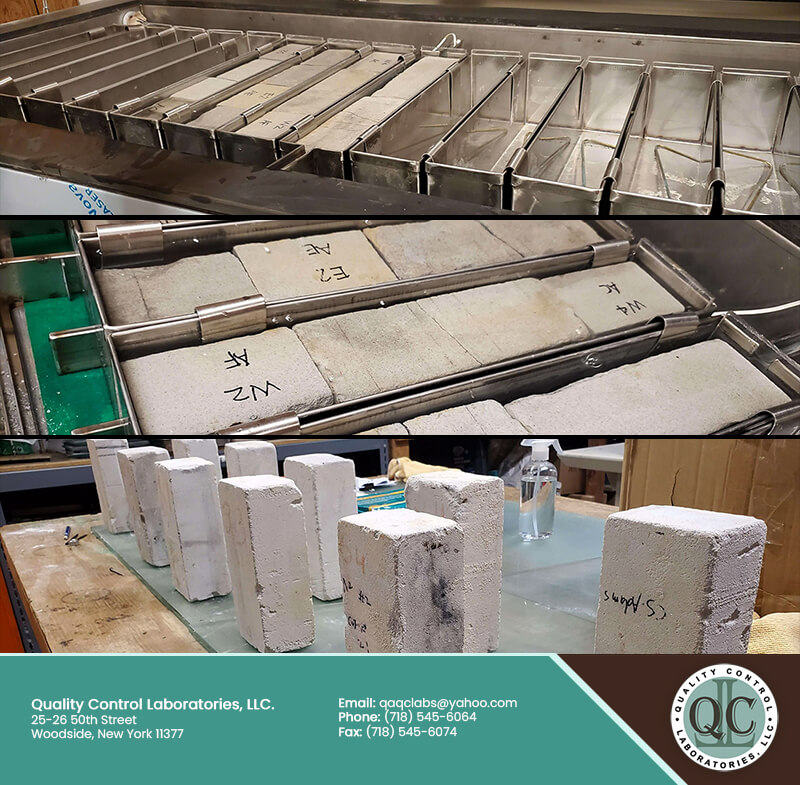QCLNY SERVICES
Materials Testing, Analysis and Evaluation
In the area of Materials Testing our company could do laboratory and field testings of asphalt, concrete, soils, welding, bolting and fireproofing.
TESTING SERVICES OFFERED
- Aggregates and Minerals Testing
- Portland Cement Testing
- Soil Testing (Sieve Analysis)
- Hot Mix Asphalt Testing
- Bituminous Concrete Tests
- Masonry Products Testing
- Grout and Mortar Materials Testing
Laboratory Materials Testing











Construction materials testing involves the essential examination of all structural materials used in the construction of a project. Industry players need to ensure that their products can withstand certain conditions and comply with increasingly complex national and international building standards and regulations.
Materials testing helps us to understand and quantify whether a specific material or treatment is suitable for a particular application. ... Material Testing may include methods that yield information about the structure or mechanical properties of the material.
Quality Control Laboratories, LLC. (QCL) offers an array of in house services that provides owners, engineers, architects and construction professionals information they need to manage success result of their project. QCL is a Material Testing and Laboratory Services that caters in 5 Boroughs of NYC, Long Island, NJ and CT. QCL is currently Licensed by the City of NY (License# 63) to perform concrete testing/ laboratory services. Below are some of the wide variety of services:
Asphalt Mixture – accredited since 6/2/2011
T30 = Mechanical Analysis of Extracted Analysis
T166 (Cores) = Bulk Specific Gravity of Compacted Asphalt Mixture using SSD specimen
T209 = Theoretical Maximum specific Gravity and Density of Asphalt Mixture
T269 = Percent Air Voids in Compacted Dense and Open Asphalt Mixtures
T308 = Determining Asphalt Binder Content of Asphalt mixtures by Ignition Method
T355 = In-Place Density of Asphalt Mixture by Nuclear Method
D2041 = Maximum Specific Gravity of Hot Mix Asphalt Paving Mixtures
D2726 (Cores), D2950, D3203, D5444, D6307, D6926
Soil – accredited since 2/16/2009
T88 = Particle Size Analysis of Soils
T89 = Determining the liquid limit of Soils
T90 = Determining the Plastic Limit and Plasticity Index of Soil
T99 = Density relations of Soils using 2.5 Kg (5.5 lbs) Rammer and 12” Drop.
T100 = Specific Gravity of Soils
T180 = Moisture Density Relations of Soil using a (10 lb) Rammer and 18” Drop.
T265 = Laboratory Determination of Moisture Contents of Soil
T267 = Determination
T310 = In-Place Density and Moisture Content of Soil and Soil-Aggregate by Nuclear Method
D421 = Dry Preparation of Disturbed Soil and Soil Aggregates Sample for Test
D422 = Particle Size Analysis of Soils by Hydrometer
D698 = The Moisture-Density Relations of Soils Using a 5.5 lb. Rammer and 12” Drop.
D854 = Specific Gravity of Soils
D1140 = Amount of Material in Soils Finer than the No. 200 Sieve
D1557 = Moisture Density relations of Soils using a 10lb. Rammer and an 18” Drop.
D2216 = Laboratory Determination of Moisture Content of Soils
D2487 = Classification of Soils for Engineering Purposes (Unified Soil Classifications System)
D2488 = Description and Identification of Soils (Visual-Manual Procedure)
D2974 = Determination of Organic Content in Soils by Loss on Ignition
D4318 = Determining the liquid Limits of Soils by Loss on Ignition
D6938 = In-Place Density and Moisture Content of Soil and Soil-Aggregate bu Nuclear method (Shallow Depth)
Aggregate – accredited since 11/1/2004
T11 / C117 = Materials Finer than (NO. 200) Sieve in Mineral Aggregates by Washing
T19 / C29 = Bulk Density (“Unit Weight”) ad Voids in Aggregate
T21 / C40 = Organic Impurities in Fine Aggregates for Concrete
T27 / C136 = Sieve Analysis of Fine and Coarse Aggregates
T84 / C128 = Specific Gravity and Absorption of Fine Aggregate
T85 / C127 = Specific Gravity and Absorption of Coarse Aggregate
T104 = Soundness of Aggregate by Use of Sodium Sulfate or Magnesium Sulfate
T176 = Plastic Fines in Graded and Soils by use of the Sand Equivalent Test
T255 / C566 = Total Evaporable Moisture Content of Aggregate by Drying
T304 = Uncompacted Void Content of Fine Aggregate
C88 = Soundness of Aggregate by Use of Sodium Sulfate or magnesium Sulfate
C702 = Reducing Samples of Aggregate to Testing Size
C1252 = Uncompacted Void Content of Fine Aggregate
D75 = Sampling Aggregate
D2419 = Plastic Fines in Graded Aggregates and Soil by Use of the sane Equivalent Test
Sprayed Fire-Resistive Material – accredited since 6/2/2011
ASTM E605 = Standard Test Methods for Thickness and Density of Sprayed Fire-Resistive Material (SFRM) Applied to Structural Members
ASTM E736 = Standard Test Method for Cohesion/Adhesion of Sprayed Fire-Resistive Materials Applied to Structural Members
Concrete – accredited since 11/1/2004
T22 / C39 = Compressive Strength of Cylindrical specimens in the Field
T23 / C31= Making and Curing Concrete Test Specimens in the Field
T24 / C42 = Obtaining and Testing Drilled Cores and Sawed Beams of Concrete
T97 / C78 = Flexural Strength of Concrete (Using Simple Beam with Third Point Loading)
T119 / C143 = Slump of Hydraulic Cement
T121 / C138 = Density (Unit Weight), Yield, and Air Content (Gravimetric) of Concrete
T148 / C174= Measuring Length of Drilled Concrete Cores
T152 / C231= Air Content to Freshly Mixed Concrete by the Pressure Method
T161 = Resistance of Concrete to Rapid Freezing and Thawing
T196 / C173 = Air Content of Freshly Mixed Concrete by Volumetric Method
T231 / C617 = (8000 psi and below) = Capping Cylindrical Specimen
T277 / C1202 = Electrical Indication of Concrete’s ability to Resist Chloride Ion Penetration
T309 / = Temperature of Freshly Mixed Portland Cement Concrete
C172 = Standard Practice for Sampling Freshly Mixed Concrete
C192 = Standard Practice for Making and Curing Concrete Test Specimen in the Laboratory
C215 = Standard Test Method for Fundamental Transverse, Longitudinal and Torsional Resonant Frequencies of Concrete Specimens
C511 = Standard Specification for Mixing Rooms, Moist Cabinets, Moist Rooms and Storage Tanks used in the filed of Hydraulic Cement and Concrete
C642 = Standard Test method of Density, Absorption, and Voids in hardened Concrete
C666 = Standard Test Method of Resistance of Concrete to Rapid Freezing and Thawing
C805 = Standard Test Method for Rebound Number of hardened Concrete.
C1064 = Standard Test Method for Temperature of Freshly Mixed Hydraulic-Cement Concrete
C1231 (7000 psi and below) = Standard Practice of Use of Unbonded Caps in Determination of Compressive Strength of hardened Cylindrical Concrete Specimens
C1542 = Standard Test Method for Measuring Length of Concrete Cores
C1583 = Standard Test Method for Tensile Strength of Concrete Surfaces and the Bond Strength of Tensile Strength of Concrete Repair
Masonry – accredited since 7/17/2009
T106 / C109 (Compressive Strength of Hydraulic Cement Mortars (Using 2-in. Cube Specimens))
T137 / C185 (Air Content of Hydraulic Cement Mortar)
T162 / C305 (Mechanical Mixing of Hydraulic Cement Pastes and Mortars of Plastic Consistency)
M201 / C511 (Moist Cabinets, Moist Rooms, and Water Storage Tanks Used in the testing of Hydraulic Cements and Concretes)
C67 (Brick: Absorption)
C67 (Brick: Capping)
C67 (Brick: Compressive Strength)
C67 (Brick: Initial Rate of Absorption)
C67 (Brick: Measurement)
C67 (Brick: Specimen Preparation)
C140 (Concrete Interlocking Paving Units) (Sampling and Testing Concrete Masonry Units and Related Units)
C140 (Concrete Masonry Units) (Sampling and Testing Concrete Masonry Units and Related Units)
C140 (Segmental Retaining Wall Units) (Sampling and Testing Concrete Masonry Units and Related Units)
C1019 (Sampling and Testing Grout)
C1437 (Flow of Hydraulic Cement Mortar)
C1506 (Water Retention of Hydraulic Cement-Based Mortars and Plasters)
C1552 (Capping Concrete Masonry Units, Related Units and Masonry Prisms for Compression Testing)
